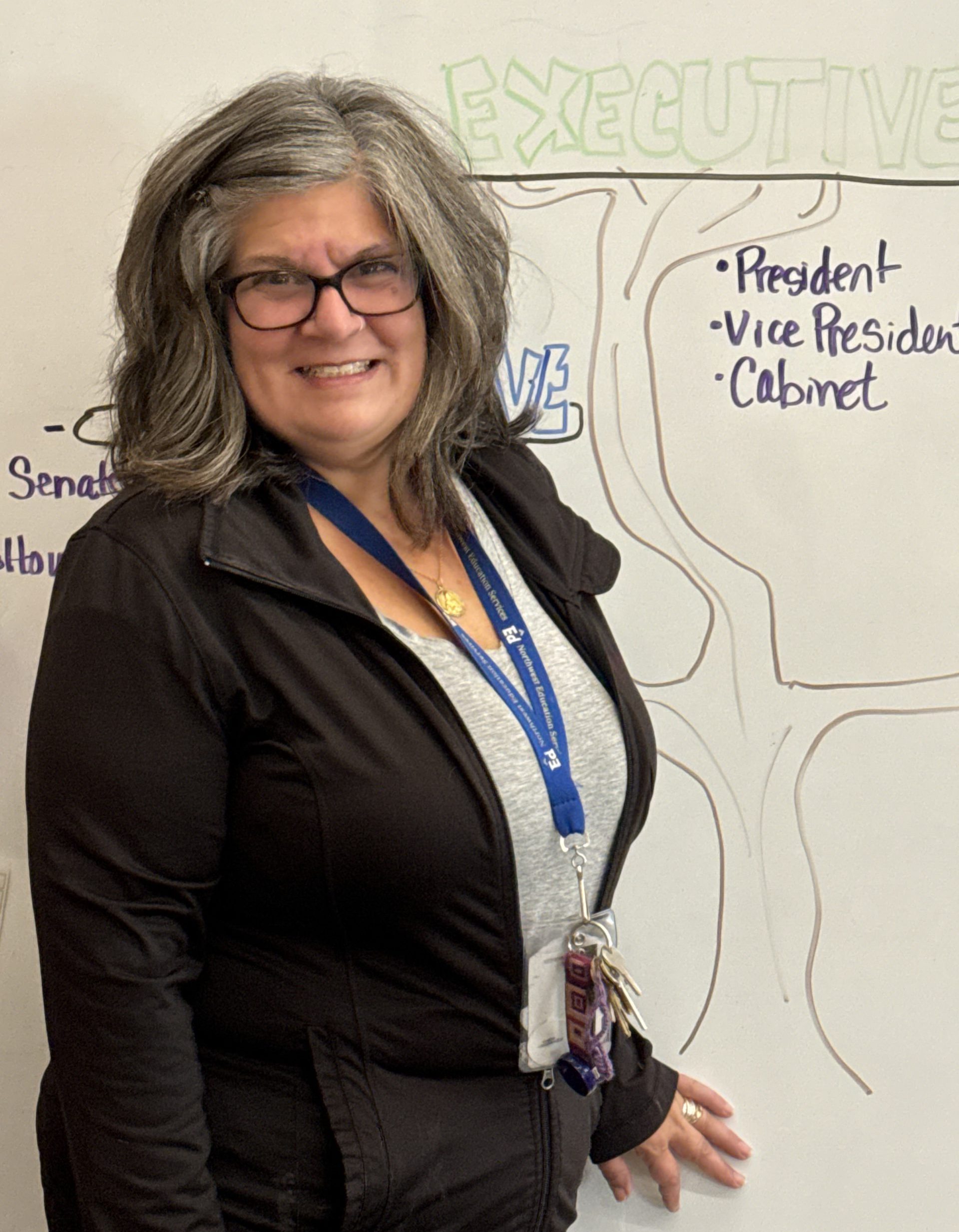New members, new bargainers, big win
By Brenda Ortega
MEA Voice Editor

Maria del Pilar Galnares knew the right thing to do when a group of unrepresented educators approached her about forming a union or joining the unit she leads at Northwest Education Services — the intermediate school district based in Traverse City.
Galnares got on board. It was unfair that these 14 teachers, literacy consultants, English learner/migrant teachers, and instructional service specialists were not included among more than 250 other professionals who belonged to the district’s bargaining unit, she said.
“Basically, we had people who were making less pay than what was on the professional pay scale in our contract,” Galnares said. “Some worked more days than everyone else, and all of them had multiple degrees — advanced degrees — and Michigan certifications.”
The local union fought to accrete the educators into their unit called the Northwest Education Services Education Association or NWESEA.
The accretion process, overseen by the Michigan Employment Relations Commission (MERC) seeks to determine if a group of employees not currently in a bargaining unit share a “community of interest” with existing members.
A secret ballot vote was held by MERC three years ago and with 100% of the votes in support of joining the union, the work of bargaining wages, hours, calendar, and working conditions for these new union members began. It was a long and difficult struggle involving numerous mediation sessions, said MEA UniServ Director Mary McGee-Cullen, who serves the unit.
It was 2022, and the union had just ratified a new three-year contract. A hard-fought letter of agreement was negotiated over 18 months to address some pay disparities for the new members, and the rest would be addressed in the next contract, McGee-Cullen said.
Fast forward to June. That contract bargain concluded with a remarkable win for everyone — but especially validating improvements for the 14 newly unionized educators. One teacher got a 63% raise. Some quit second jobs or decided they could afford to start a family.
A veteran MEA staff negotiator, McGee-Cullen said the three-year settlement was particularly rewarding to achieve because the disparate treatment had been so egregious.
“This was absolutely life-changing for many members in this bargaining unit. I get goosebumps every time I talk about it; there were lots of joyful tears.”
For Galnares, who was a brand new local president when the group first inquired about joining the union, the outcome is satisfying.
“I worked hard because I believed in something,” she said. “These people give their all to this district and the students we serve, and now they have representation. Now their pay reflects their hard work. That feels good.”
It’s important to note the contract deal was struck by an all-new bargaining team whose members had to learn how to negotiate, master their approach, and stay disciplined at the negotiating table, Galnares said.
“We didn’t ask for too much. We didn’t ask for too little. We asked for what we thought would work.”
Success could not have happened without a unified, engaged, active membership along with training, financial data, and proposal analyses from MEA’s professional staff, including Bargaining Consultant Craig Culver and Labor Economist Tanner Delpier, she added.
“It really was a village that created this, and people are happy; they’re relieved.”
Leave none behind

Beyond issues of right and wrong, the struggle held personal meaning for Galnares, who has taught at the ISD in a center-based program for children with emotional impairment for 29 years.
Among the 14 accreted members were four teachers who work with migrant students, those children whose families move frequently to perform temporary or seasonal work in agriculture or fishing. Frequent movement puts the children at-risk of losing out on learning.
The godmother of Galnares’ brother, Jean Franco, pioneered what is now the Migrant Education Program in Traverse City in the 1960s. And Galnares’ father, John Galnares — who taught at Traverse City Senior High School for 31 years — would later work with Franco in the program.
Described in her obituary as “a teacher of teachers” and “a celebrity in her own right in the community,” Franco became executive director of the Northwestern Michigan Migrant Program in 1971 and retired at age 88 in 2012.
“She wholly loved people and kids,” her obituary reads. “Close friends recall that although Jean never had biological children, she considered all the students in the migrant school her kids. Jean believed that all children deserved the opportunity to progress in life.”
John Galnares worked as an administrator in the migrant program through the 1980s, his daughter said. He died last year. Franco passed away at age 98 in 2022, the same year that migrant teachers were accreted into the union.
“Jean Franco was an amazing woman, and my father worked very hard as a supervisor for her,” Galnares said. “It was a really big thing for him, coming from a Hispanic background, to get the kids out of the field.”
Before joining the union, the four migrant teachers were severely overworked and underpaid, McGee-Cullen said. As highly qualified educators serving migrant students across seven counties, they worked 35 extra days per year and made $41,000.
“Now that they’re on the professional salary schedule, those migrant teachers are working 35 fewer days and making about $30,000 more,” McGee-Cullen said.
Before the new contract was settled, one veteran teacher in the program had tearfully told Galnares she didn’t know how much longer she could do it. Galnares urged her to hang on, and she did.
“We have the second-largest migrant population in Michigan right now,” Galnares said. “For me, it was super important that when those students that travel the country come here, they have the same access to highly qualified teachers as anyone else, and that those teachers are respected.”
The district kept trying to separate the migrant teachers from the salary schedule because part of their pay is covered by federal grants, McGee-Cullen said. But the bargaining team was committed to leave no one behind, she added, “because it was the right thing to do.”
The team held strong because they knew from MEA’s detailed financial analysis that what they were seeking was reasonable, Galnares said. “There were rough patches, of course, but we knew we weren’t crazy, and we were able to hold our ground and counter with confidence.”
People feel valued

All of the 14 new members received pay hikes because they had been subjected to arbitrary and inequitable management decisions about pay in the past, including new employees being hired at higher salaries than 25-year veterans.
The bargainers ensured employees were placed on the salary schedule at their level of education and experience. Galnares said, “I had one person that said to me, ‘This is life altering; I don’t have to work a second job — I get to go home and be with my kids.’”
Instructional calendars were standardized to ensure those who worked days beyond the contractual number would receive additional pay.
School psychologist Lauren Holmes, who served as the union’s lead negotiator, is one of the MEA members who joined the unit in 2022. Collective action is the only way to address persistent systemic pay and workload inequities, she said.
“If we want a decent contract, or decent working conditions — caseload sizes — we have way more leverage as a unit rather than as individuals,” she said.
A 14-year employee of the district, Holmes supports area elementary schools with special education evaluations, data collection, behavior intervention plans, multi-tiered systems of support, and more.
Key to the team’s success was an annual MEA bargaining training they attended for northern Michigan locals, she said. Armed with tools, financial analyses and a bargaining plan, the group committed to stay the course and continued to use MEA resources as needed.
In addition, members engaged by writing letters to the board and regularly attending board meetings, and the bargaining team kept them informed. “It was so essential to have that unified cohesive front to get these inequalities taken care of,” Holmes said.
In the end, everyone appreciated the solid contract gains that emerged from negotiations, she said. The schedule increases each year of the deal, 5%-4%-4%, and improvements were won in MESSA ancillary benefits, mentor pay, mileage, and more.
“I’m still getting thank yous, just lots of gratitude and joy,” Holmes said. “People feel valued for all of the work they’re putting in.”
On a larger scale, the teamwork and success of the bargain has prompted a positive change in the union’s overall culture and solidarity, Galnares added.
“There’s been a shift in the environment that’s small but noticeable. I think people are realizing that Wow, I have a say in what we do here. I have a say in my future.”



